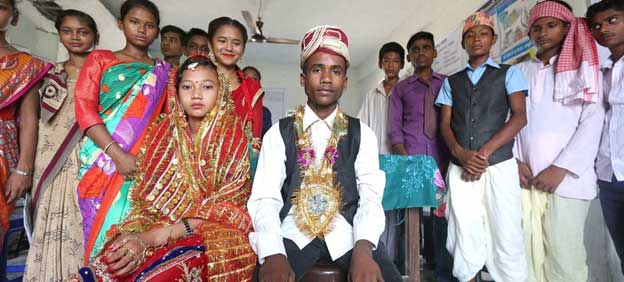Raising the Alarm on the Slow Pace of Family Law Reform

COLOMBO, Sri Lanka, Dec 22 (IPS) - The writer is Campaign Manager - Global Campaign for Equality in Family LawIn September 2021, in the midst of a pandemic-related lockdown, a 15-year-old Muslim girl from Colombo, Sri Lanka was married off by her relatives to a much older man.
A local women’s rights group reported this case to the national child protection authorities, however, because child marriage is still legal under the country’s Muslim Marriage and Divorce Act (MMDA), little could be done.
Nine months later, the girl was divorced by her husband at the Quazi (Muslim-judge) led court under a provision in the MMDA that allows him to unilaterally divorce at will and without any reason.
Many countries, especially in Asia, the Middle East and North Africa (MENA), and Africa, continue to have civil, religious, or customary laws and practices on marriage and family matters that curtail the rights of women and girls.
An alarming finding in a new report, ‘Progress on the Sustainable Development Goals: The gender snapshot 2022’, released by UN Women and the UN Statistics Division, indicated that at the current rate of progress it may take up to 286 years to close gaps in legal protection between men and women and remove laws that discriminate against women and girls on the basis of their sex.
The report concluded that the world is not on track to achieve gender equality by 2030.
Sex discrimination in family law
Discrimination in family laws, specifically when it relates to marriage and family, spans from the time of entry into marriage, during the marriage, and at the time of dissolution of the marriage.
Organizations like Musawah have been mapping Muslim family laws in over 38 countries in three regions. Their research shows that the male guardianship system, where men are considered heads of the household and have legal authority over wives, daughters, and mothers, is very prevalent in MENA, South and Southeast Asia, and Sub-Saharan Africa.
Divorce rights continue to be unequal for women. In Algeria, Maldives, Malaysia, Pakistan, Indonesia, Sudan, Saudi Arabia, and Qatar, women have more conditions and procedures than men in seeking a divorce.
Equal right to child custody and custody arrangements that center on the needs of the child, remains a challenge for mothers in the MENA region, and in Latin American countries like Brazil, Mexico, and Argentina.
Inheritance rights are still unequal in many parts of the world. World Bank (2018) data showed that at least 39 countries prevent daughters from inheriting the same proportion of assets as sons.
Family law is a critical issue of our time
Inequalities faced by women and girls under discriminatory family laws and practices affect all other areas of their lives.
According to the report by international women’s rights organization Equality Now, Words and Deeds: Holding Governments Accountable in the Beijing +25 Review Process, “sex discriminatory personal status laws violate women’s civil and political rights.” It gives examples of legal discrimination in numerous countries and notes that such laws, especially relating to property and inheritance, inhibit women’s full social and economic participation and opportunities.
There is also a direct correlation between legal authority and power afforded to males in the family, and restrictions on women’s autonomy and agency, along with an increased likelihood of experiencing sexual and domestic violence.
These inequalities have surged during the COVID-19 pandemic and ongoing economic, political, and climate crises. In April 2020, UNFPA predicted that the COVID-19 pandemic may result in 13 million extra child marriages in the years immediately following this global health emergency.
Women activists calling for reform face serious opposition
For decades, women's rights groups and activists in countries such as Malaysia, Morocco, India, Sri Lanka, Afghanistan, and Uganda, to name a few, have been advocating for the reform of unequal family laws. In Iran, women are currently leading the national struggle for free will to decide on matters of personal choice like dress code and other fundamental freedoms.
Activists calling for change face heavy opposition, including intimidation and threats from conservative religious and right-wing groups, who often claim that family laws and practices are a matter of freedom of religion and belief.
But rights groups are pushing back by repeatedly making the case that freedom of religion or belief can never be used to justify inequalities towards women and girls and that human rights cannot stop at the front door of a family home.
Despite growing evidence of the impacts of discriminatory family laws, state action and political will towards reforming discriminatory laws, especially family laws, is almost non-existent. In fact, in countries like Iran and Afghanistan, women activists also face direct risk and harm to life and limb from state authorities themselves.
The need for global action
The Global Campaign for Equality in Family Law was launched in March 2020 by eight leading women’s rights and faith-inspired organizations, as well as UN Women. The Campaign is calling for governments to prioritize equality in family law, policy, and practice, especially in light of multiple other crises that affect women and girls disproportionately.
In tandem, efforts of courageous community and national activists pushing for reform of discriminatory family laws need to be amplified and resourced. Regionally and globally, feminist movements must further promote family law reform as a crucial issue.
Achieving gender equality without equality in the family is impossible. We cannot wait 286 years before countries are free of laws, procedures, and practices that discriminate against women and girls.
The time to put family law reform on the agenda is now!
IPS UN Bureau
Follow @IPSNewsUNBureau
Follow IPS News UN Bureau on Instagram
© Inter Press Service (2022) — All Rights Reserved. Original source: Inter Press Service

